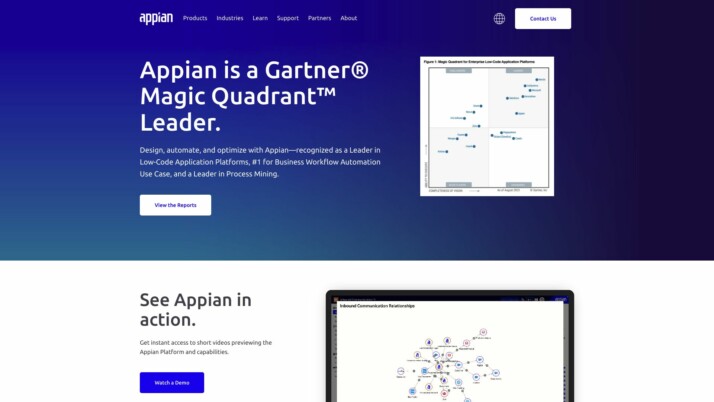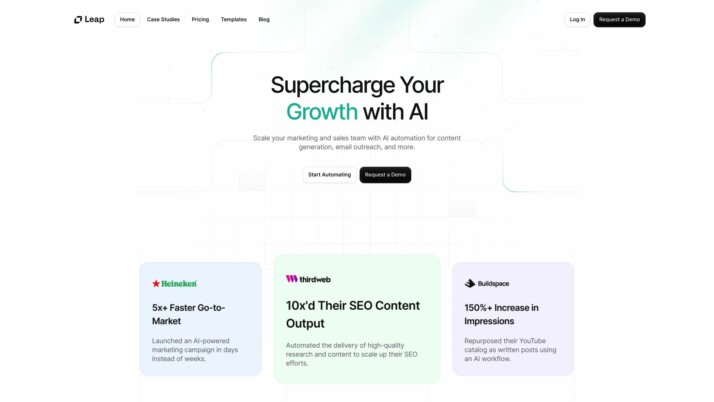Appian vs. Leap AI: Comparing Enterprise and No-Code AI Solutions
AI platforms revolutionize how businesses operate, automate processes, and innovate. Appian vs. Leap AI represent two distinct approaches to harnessing AI power. Appian offers a robust low-code platform for enterprise-grade AI applications, while Leap AI democratizes AI development with its no-code interface.
This comparison explores their key features, strengths, and limitations, helping you determine which solution best fits your organization’s needs. We’ll also introduce SmythOS, a cutting-edge alternative that combines the best of both worlds and pushes the boundaries of AI capabilities. Whether you’re a developer seeking customization or a business user looking for accessibility, this guide equips you with the knowledge to make an informed decision in the evolving AI landscape.
Appian Overview
Appian delivers a comprehensive low-code platform for building and deploying AI-powered applications. The platform combines visual development tools with pre-built AI capabilities, enabling organizations to rapidly create intelligent automation solutions.


Appian’s AI offerings focus on enhancing business processes through document intelligence, natural language processing, and predictive analytics. Key features include AI-powered document extraction, email classification, and integration with large language models. These tools allow businesses to automate tasks like processing invoices, routing customer inquiries, and generating insights from unstructured data.
The platform stands out for its emphasis on enterprise-grade security and scalability. Appian ensures AI models and data remain private, addressing concerns around data protection and compliance. This makes it particularly suitable for industries with strict regulatory requirements, such as finance and healthcare.
Appian delivers a comprehensive low-code platform for building and deploying AI-powered applications… enabling organizations to rapidly create intelligent automation solutions.
While Appian provides powerful AI capabilities, it may require more technical expertise compared to some no-code alternatives. The platform’s strength lies in its ability to integrate AI into complex business workflows, rather than offering standalone AI agents. This focus on process automation means it may not be the best fit for users seeking to build conversational AI or autonomous agents.
Appian’s integration capabilities allow it to connect with a wide range of enterprise systems and data sources. This enables organizations to leverage existing investments while adding AI-powered intelligence to their operations. The platform also provides robust monitoring and analytics tools, allowing users to track the performance of AI models and continuously improve their effectiveness.
Leap AI Overview
Leap AI empowers users to create sophisticated AI workflows without coding expertise. The platform’s no-code interface allows rapid development of AI-powered applications, from chatbots to content generators. Leap AI supports multiple AI models, including OpenAI GPT, Mistral 7b, and Stable Diffusion XL, enabling diverse tasks like text generation, image creation, and music composition.


Leap AI empowers users to create sophisticated AI workflows without coding expertise. The platform’s no-code interface allows rapid development of AI-powered applications, from chatbots to content generators.
The software excels in its integration capabilities, seamlessly connecting with popular tools such as Slack, Hubspot, and Zapier. This versatility makes Leap AI particularly attractive to businesses seeking to enhance their existing workflows with AI technology. The platform’s user-friendly dashboard and visual editor simplify the process of designing and executing AI workflows, making advanced AI accessible to a broader audience.
Leap AI’s strength lies in its extensive template library, offering pre-built solutions for common AI applications. These templates accelerate development time, allowing users to quickly implement AI solutions for tasks like blog post generation, lead summarization, and personalized content delivery. The platform also provides robust SDKs in multiple languages, facilitating seamless integration into various applications.
Leap AI’s strength lies in its extensive template library, offering pre-built solutions for common AI applications. These templates accelerate development time, allowing users to quickly implement AI solutions…
While Leap AI offers powerful features for AI workflow creation, it may have limitations in areas such as advanced debugging tools or specialized features for multi-agent collaboration. The platform’s focus on accessibility and ease of use might come at the cost of some advanced customization options that expert developers might require for highly specialized AI applications.
Leap AI’s vision of democratizing AI technology positions it as a valuable tool for businesses and individuals looking to leverage AI without extensive technical expertise. By providing a user-friendly platform for creating customized AI workflows, Leap AI enables users to automate complex tasks, improve efficiency, and drive innovation across various domains.
Feature Comparison
Appian and Leap AI offer distinct approaches to AI integration and workflow automation, each with its own strengths and limitations. Appian excels in enterprise-grade process automation with AI capabilities, while Leap AI focuses on democratizing AI development through a no-code interface.
Appian’s strength lies in its comprehensive low-code platform for building AI-powered business applications. It provides robust document intelligence and natural language processing features, ideal for automating complex workflows in regulated industries. However, Appian lacks some advanced AI agent capabilities like autonomous collaboration and multimodal interactions.
Leap AI, on the other hand, emphasizes accessibility and rapid AI development. Its no-code interface and extensive template library enable quick creation of AI workflows for tasks like content generation and chatbots. While Leap AI offers impressive integration capabilities with popular tools, it may fall short in areas like advanced debugging and multi-agent collaboration that Appian provides.
In terms of security and compliance, Appian has a clear advantage with its focus on data privacy and enterprise-grade security measures. This makes it particularly suitable for industries with strict regulatory requirements. Leap AI, while offering standard security features, may not match Appian’s depth in this area.
Both platforms have limitations in certain advanced AI functionalities. Neither offers robust support for autonomous agents, constrained alignment, or sophisticated multi-agent collaboration. Additionally, features like sitemaps and URL crawlers are not prominently featured in either platform, potentially limiting their use in certain web-based applications.
Feature Comparison Table
| Appian | Leap AI | SmythOS | |
|---|---|---|---|
| CORE FEATURES | |||
| Hosted Agents (Dev, Production) | ❌ | ❌ | ✅ |
| Autonomous Agents | ❌ | ❌ | ✅ |
| Explainability & Transparency | ✅ | ❌ | ✅ |
| Debug Tools | ✅ | ❌ | ✅ |
| Multi-Agent Collaboration | ❌ | ❌ | ✅ |
| Agent Work Scheduler | ❌ | ✅ | ✅ |
| SECURITY | |||
| Constrained Alignment | ✅ | ❌ | ✅ |
| COMPONENTS | |||
| Foundation AIs | ❌ | ✅ | ✅ |
| Huggingface AIs | ❌ | ✅ | ✅ |
| Zapier APIs | ❌ | ✅ | ✅ |
| Data Lakes | ✅ | ❌ | ✅ |
| DEPLOYMENT OPTIONS (EMBODIMENTS) | |||
| Deploy as Site Chat | ❌ | ✅ | ✅ |
| Deploy as Scheduled Agent | ❌ | ✅ | ✅ |
| Deploy as GPT | ❌ | ✅ | ✅ |
| DATA LAKE SUPPORT | |||
| Hosted Vector Database | ❌ | ❌ | ✅ |
| Sitemap Crawler | ❌ | ✅ | ✅ |
| YouTube Transcript Crawler | ❌ | ✅ | ✅ |
| URL Crawler | ❌ | ✅ | ✅ |
Best Alternative to Appian and Leap AI
SmythOS stands out as the superior alternative to Appian and Leap AI, offering a comprehensive platform for AI agent development and deployment. We combine the best of both worlds: enterprise-grade capabilities and user-friendly design.
Our drag-and-drop interface surpasses Appian’s low-code approach and Leap AI’s no-code system. Users create sophisticated AI workflows effortlessly, connecting various data sources, APIs, and AI models without extensive coding knowledge. This democratizes AI development across skill levels.
Users create sophisticated AI workflows effortlessly, connecting various data sources, APIs, and AI models without extensive coding knowledge.
Unlike Appian and Leap AI, SmythOS excels in autonomous agent capabilities. Our platform supports multi-agent collaboration, allowing AI agents to work together on complex tasks. This feature, absent in both Appian and Leap AI, opens up new possibilities for automation and problem-solving.
SmythOS offers unparalleled flexibility in deployment options. We enable users to deploy AI agents as APIs, webhooks, scheduled tasks, or integrate them directly into existing systems. This versatility surpasses both Appian’s focus on enterprise applications and Leap AI’s limited deployment options.
Our commitment to security and scalability sets us apart. We provide robust data encryption, OAuth integration, and IP control features, ensuring enterprise-grade security. Coupled with our scalable architecture, SmythOS meets the demands of growing businesses and large-scale deployments more effectively than our competitors.
Conclusion
Appian and Leap AI offer powerful AI-driven solutions, each with unique strengths. Appian excels in enterprise-grade process automation, providing robust security and compliance features ideal for regulated industries. Its low-code platform enables the creation of AI-powered business applications, though it may require more technical expertise. Leap AI, on the other hand, democratizes AI development with its no-code interface and extensive template library, making it accessible to a broader audience. However, it may lack some advanced features for complex enterprise needs.
While both platforms have their merits, SmythOS emerges as the superior choice, combining the best of both worlds and offering additional cutting-edge capabilities. SmythOS provides a user-friendly drag-and-drop interface similar to Leap AI, but with the robustness and scalability reminiscent of Appian. It goes beyond by offering unparalleled flexibility in AI model integration, supporting over 300,000 integrations, and enabling deployment across various platforms.
SmythOS stands out with its multi-agent collaboration features, advanced debugging tools, and the ability to create autonomous agents. These capabilities, coupled with its extensive integration ecosystem and versatile deployment options, make SmythOS the ideal choice for businesses seeking to harness the full potential of AI. Whether you’re a developer looking for customization or a business user seeking no-code solutions, SmythOS adapts to your needs.
To experience the future of AI automation and unlock unprecedented efficiency in your workflows, explore SmythOS’s diverse range of AI-powered agent templates. For those ready to revolutionize their approach to AI integration, create a free SmythOS account and start building AI agents with no time limit. Elevate your AI capabilities and drive innovation across your organization with SmythOS – the comprehensive platform that truly delivers on the promise of AI-powered productivity.
Last updated:
Disclaimer: The information presented in this article is for general informational purposes only and is provided as is. While we strive to keep the content up-to-date and accurate, we make no representations or warranties of any kind, express or implied, about the completeness, accuracy, reliability, suitability, or availability of the information contained in this article.
Any reliance you place on such information is strictly at your own risk. We reserve the right to make additions, deletions, or modifications to the contents of this article at any time without prior notice.
In no event will we be liable for any loss or damage including without limitation, indirect or consequential loss or damage, or any loss or damage whatsoever arising from loss of data, profits, or any other loss not specified herein arising out of, or in connection with, the use of this article.
Despite our best efforts, this article may contain oversights, errors, or omissions. If you notice any inaccuracies or have concerns about the content, please report them through our content feedback form. Your input helps us maintain the quality and reliability of our information.
